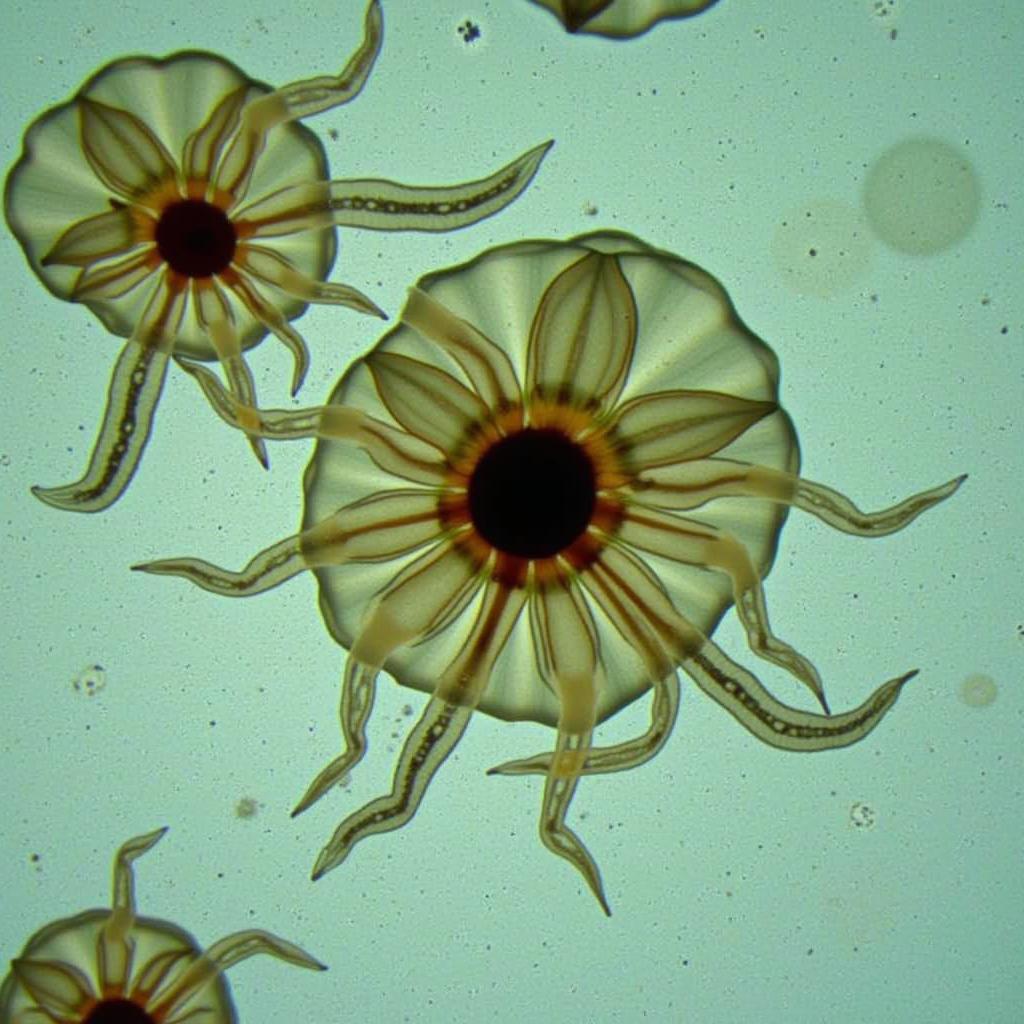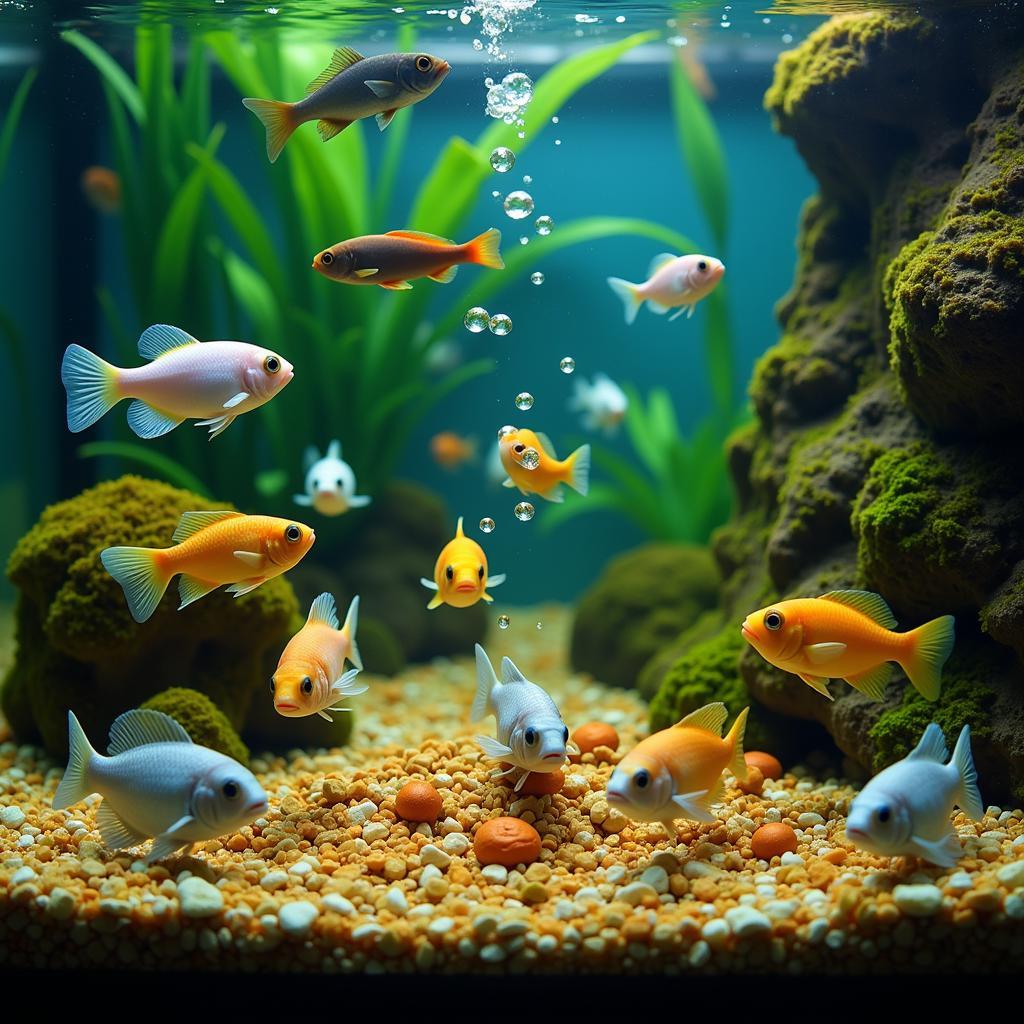Cyclops Fish Food is a popular live food option for aquarium enthusiasts, especially those raising fry or smaller fish species. This nutrient-rich food source offers a range of benefits, promoting healthy growth and vibrant coloration in your aquatic pets. Let’s dive into the world of cyclops and discover why it’s a top choice for many fish keepers.
Understanding Cyclops: The Tiny Powerhouse
Cyclops are small crustaceans, barely visible to the naked eye, found in freshwater environments. Their high protein and fatty acid content makes them an ideal nutritional supplement for fish, particularly during crucial growth stages. While often referred to as “fish food,” cyclops also play a vital role in the aquatic ecosystem, serving as a food source for larger organisms. They’re a natural part of the food chain, making them a biologically appropriate choice for your aquarium inhabitants. Their constant movement also stimulates the natural hunting instincts of fish, enriching their environment and reducing boredom. Choosing cyclops fish food contributes to a thriving, dynamic ecosystem within your tank.
 Cyclops Fish Food Under Microscope
Cyclops Fish Food Under Microscope
Types of Cyclops Fish Food
Cyclops fish food is available in various forms, each with its own advantages. Freeze-dried cyclops is a convenient option, offering a long shelf life and ease of use. Live cyclops provides the most natural and stimulating feeding experience, while frozen cyclops offers a balance between convenience and nutritional value. Understanding the different types helps you choose the best fit for your aquarium setup and the specific needs of your fish.
Freeze-Dried Cyclops
Freeze-drying preserves the nutritional value of cyclops while removing the moisture content. This process extends shelf life and eliminates the risk of introducing unwanted parasites or bacteria into your aquarium. Freeze-dried cyclops is a practical choice for busy aquarists or those who prefer a less messy feeding option.
Live Cyclops
Live cyclops are highly nutritious and offer a stimulating feeding experience for fish. Observing your fish actively hunt for live cyclops can be a rewarding experience, mimicking their natural behavior. However, sourcing live cyclops requires careful consideration to ensure they are free from diseases and contaminants.
Frozen Cyclops
Frozen cyclops provides a convenient alternative to live food, offering a good balance between nutrition and ease of use. Freezing helps preserve the nutritional content while minimizing the risk of contamination. Frozen cyclops is often readily available and easy to store, making it a popular choice for many aquarists.
 Feeding Fish with Cyclops Fish Food
Feeding Fish with Cyclops Fish Food
Benefits of Cyclops Fish Food
Cyclops fish food offers a wealth of benefits for your aquarium inhabitants. The high protein content promotes healthy growth and development, particularly in young fish. Essential fatty acids contribute to vibrant coloration and overall well-being. The small size of cyclops makes them ideal for fry and smaller fish species, ensuring they can easily consume and digest the food. Including cyclops in your fish’s diet contributes to a balanced and nutritious feeding regime.
How to Feed Cyclops Fish Food
Feeding cyclops fish food is relatively straightforward. For freeze-dried cyclops, simply sprinkle the desired amount onto the water surface. Frozen cyclops should be thawed before feeding to prevent shock to your fish. Live cyclops can be added directly to the aquarium, allowing your fish to actively hunt and consume them.
Feeding Frequency
The ideal feeding frequency depends on the age and species of your fish. Young fish require more frequent feedings, while adult fish can be fed less often. Observe your fish’s eating habits and adjust the feeding frequency accordingly to prevent overfeeding and maintain water quality.
Choosing the Right Cyclops Fish Food
Selecting the right cyclops fish food depends on several factors, including the type of fish you keep and your personal preferences. Consider the convenience of freeze-dried, the nutritional benefits of live, and the balance offered by frozen cyclops.
Conclusion
Cyclops fish food is a valuable addition to any aquarist’s toolkit. Its high nutritional value, combined with its various forms, makes it a versatile choice for promoting the health and vitality of your fish. By understanding the different types and benefits of cyclops, you can make informed decisions about incorporating this powerful food source into your aquarium feeding regimen. Remember to choose high-quality cyclops fish food from reputable sources to ensure the best possible outcome for your aquatic companions.
FAQ
-
Is cyclops fish food suitable for all fish species? While many fish species benefit from cyclops, some larger fish may find them too small to be a primary food source.
-
How should I store freeze-dried cyclops? Store freeze-dried cyclops in a cool, dry place to maintain its freshness and nutritional value.
-
Can I culture live cyclops at home? Yes, it is possible to culture live cyclops, but it requires careful attention to water quality and maintenance.
-
How do I know if my fish are getting enough cyclops? Observe your fish’s eating habits and adjust the feeding frequency based on their needs.
-
What are the signs of overfeeding with cyclops? Overfeeding can lead to poor water quality, so monitor your aquarium for signs of ammonia spikes or uneaten food.
-
Can I mix cyclops with other fish foods? Yes, cyclops can be a valuable supplement to a varied diet, providing additional nutrients and variety.
-
Where can I buy high-quality cyclops fish food? Reputable aquarium stores and online retailers are good sources for high-quality cyclops fish food.
Scenarios
-
Raising Fry: Cyclops are an excellent first food for many fry due to their small size and high nutritional value.
-
Boosting Coloration: The fatty acids in cyclops can enhance the natural colors of your fish.
-
Encouraging Natural Hunting Behavior: Live cyclops stimulate the hunting instincts of your fish.
-
Supplementing a Varied Diet: Cyclops can be used to add variety and nutritional value to a fish’s diet.
Further Reading and Resources
For more information about fish food, you can explore our article on ember tetra food.
Contact Us
For any assistance or further inquiries, please contact us: Phone: 02437655121, Email: minacones@gmail.com or visit us at 3PGH+8R9, ĐT70A, thôn Trung, Bắc Từ Liêm, Hà Nội, Việt Nam. We have a 24/7 customer support team.